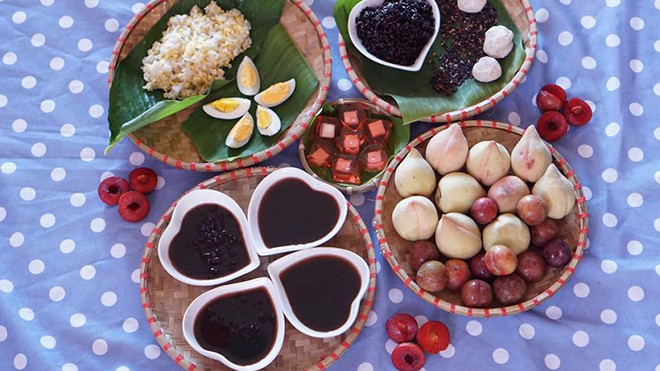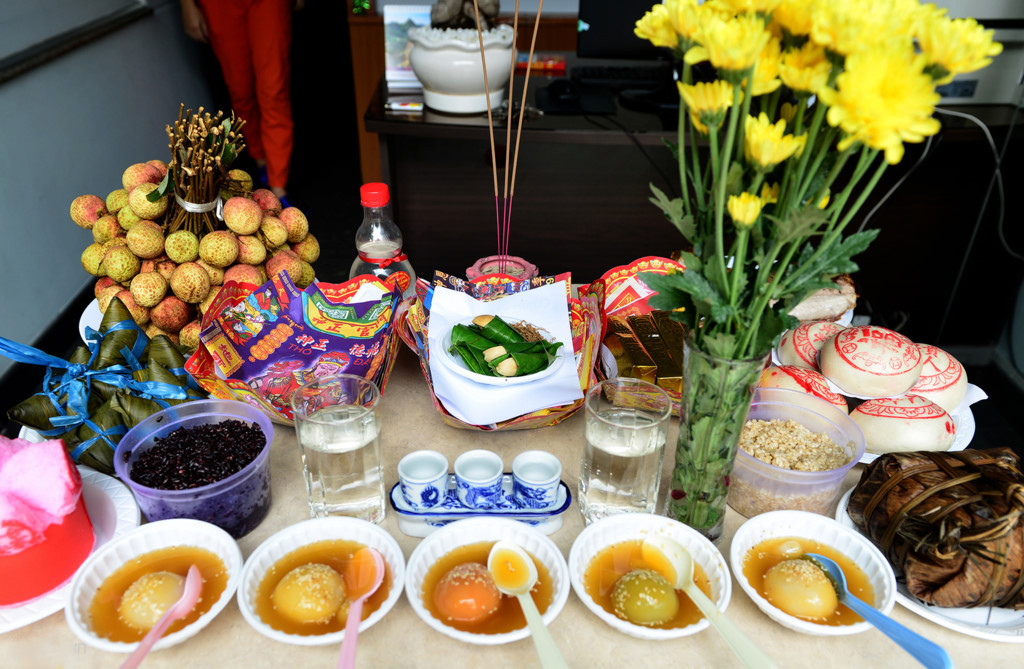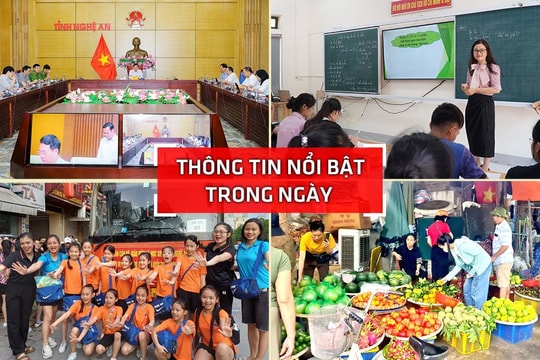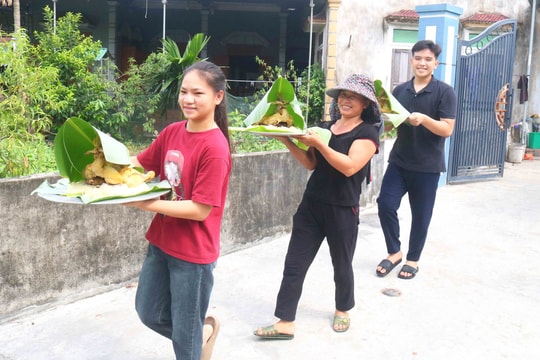The origin of the Vietnamese Dragon Boat Festival
Every year, on the 5th day of the 5th lunar month, our people celebrate the Duanwu Festival. Regarding the origin of the Duanwu Festival, many people still believe that it originated from China. However, based on a number of cultural research projects, it shows that the Duanwu Festival of the Vietnamese people today has a completely different origin...
Is the Dragon Boat Festival to commemorate Qu Yuan?
According to the explanation of scholar Chu Xu in the book “Phong Tho Ky”, the Doan Ngo Festival is also called the Doan Duong Festival. Doan Ngo means the beginning of noon (Doan: beginning, Ngo: noon). Duong is the sun, the yang energy; Doan Duong means the beginning when the yang energy is at its peak.

Nowadays, the popular belief is that the origin of the Vietnamese Duanwu Festival comes from China. This idea is associated with a character in Chinese history, Qu Yuan.
Qu Yuan, whose given name was Ping, and whose nickname was Ling Jun (340 BC - 278 BC) was a politician and a famous patriotic poet of the Chu state, who held the position of Left Tutor for King Huai of Chu. At first, he was loved by the king, but later, some officials were jealous of his talent and sought to harm him. The Chu king heard his slander and hated him. He was sad and worried and wrote the poem Ly Tao to describe his sadness at being abandoned by the king.
Towards the end of his life, he was exiled to Jiangnan (south of the Yangtze River) by King Xiang (the successor of King Huai of Chu). He was discouraged, considered himself a pure man living in a chaotic time, sang like a madman all day, wrote the poem "Hoai Sa" then hugged a rock, threw himself into the Mi La River and committed suicide.
According to this legend, to commemorate him and his tragic death, every year on the 5th of May people celebrate the Duanwu Festival in China and some other countries in Asia.
In fact, since the end of the Eastern Han Dynasty, people have found collected documents about the Duanwu Festival. Most scholars at that time believed that the origin of this ceremony was "related" to the commemoration of the famous poet of the Chu state, Qu Yuan. However, Chinese historians at that time did not provide specific documents to prove this "relationship".
Even in Sima Qian’s “Records of the Grand Historian” (145-86 BC), the work considered the earliest achievement, the most complete record of ancient Chinese history (2,000 years from the time of the Yellow Emperor to the time of Emperor Wu of Han), it was completely impossible to determine clearly the date and month of Qu Yuan’s suicide. Sima Qian’s records in “The Biography of Qu Yuan” (Records of the Grand Historian) were only materials collected from the people!
So what is the basis for saying that the Duanwu Festival (the 5th day of the 5th lunar month) is to commemorate Qu Yuan as some people still believe today!?
About the origin of the Dragon Boat Festival
In Vietnam, the Duanwu Festival is also known by a more popular name: Insect Extermination Festival. This is one of the traditional holidays with rich cultural connotations. Not only in Vietnam or China, but also in Korea and the Republic of Korea, there is the Duanwu Festival. From that, it can be seen that the Duanwu Festival is actually an East Asian holiday custom and is closely linked to the concept of the cycle of weather throughout the year.
In Vietnamese folk songs there is also a saying: "In April, measure beans to cook sweet soup/ Celebrate the Dragon Boat Festival and return in May."
However, the question here is: Is the Vietnamese Duanwu Festival related to the Chinese Duanwu Festival and the legend of Qu Yuan as has long been believed?
The Vietnamese also call the Doan Ngo Festival by another name, “Half-Year Festival” (some places also call it Mid-Year). This is considered a unique Vietnamese name, not to be confused with the names of other countries. So why is it called Half-Year Festival, while according to the current lunar calendar, “half-year” here must fall in the 6th lunar month?
Regarding the name Half-year Tet, author Nguyen Ngoc Tho in “Again discussing the origin of Doan Ngo festival” explains: “In ancient times, Vietnamese people used the Kien Ty calendar, so the first month of the year was the 11th lunar month. According to this calculation, the 5th of May falls at the halfway point of the year, so the Vietnamese people really like the name Half-year Tet.”
Regarding the origin of the Duanwu Festival, cultural researcher Tran Ngoc Them affirmed: The Vietnamese Duanwu Festival has the same origin as the Bai Viet land in Southern China (around the lower Yangtze River and below) and Northern Indochina.
Author's explanation: Since ancient times, this has been a fertile rice-growing area built by the Baiyue people. Because it lies along both sides of the Tropic of Cancer, the summers here are hot and uncomfortable, negatively affecting people's health.
Fortunately, farmers with wet rice farming always have to observe the weather, try to avoid its harmful effects as much as possible and effectively take advantage of the advantages that nature brings, thanks to which the Doan Ngo festival custom was formed, marking an important milestone in the weather cycle (Finding the identity of Vietnamese culture, Ho Chi Minh City Publishing House, 2004).
In the book “Chinese Festivals” by W. Eberhard (Chinese Festivals, NY 1952), it is written: “Double fifth is a Southern festival, lucky festival or festival of the living.”
Author Nghe Nong Thuy, of the Chinese Ethnology Association, also admitted: "The Duanwu Festival is a great contribution of the Baiyue people to Chinese culture" (Chinese Ethnology Association, 2011).
Thus, it can be seen that the ancient Duanwu Festival was created by the working people together, enjoyed the fruits together and no one was the specific author. It was the result of the wisdom of the Southern agricultural tradition of the Baiyue tribes.
Later, along with the invasion and expansion of territory south of the Yangtze River, the Duanwu Festival was accepted and celebrated by the Han people. However, in many different localities, it was associated with many different legends with characters such as Wu Zixu, King of Viet Cau Tien, Qu Yuan to Cao Nga, Tran Lam... Therefore, it is impossible to believe that the Duanwu Festival of the Vietnamese originated from China as some people still mistakenly believe today.

Worship on the Dragon Boat Festival
Like other festivals, people celebrate the Duanwu Festival with offerings.
In villages, there are ceremonies at communal houses and temples; in hamlets, there are ceremonies at shrines. In families, there are ceremonies to worship ancestors and the Land God. The offerings are rice wine and fruit. After the ceremony, people eat it; no one throws it into the river like the custom in China. In particular, families of doctors also have an additional ceremony to worship the Holy Teacher.
Customs on the Dragon Boat Festival
After the Doan Ngo festival, there are customs such as killing insects, dyeing fingernails and toenails, bathing in coriander leaves, examining trees for fruit, picking herbs at noon, hanging mugwort to ward off evil spirits...
Most of the above customs have been abolished to date, only the customs of killing insects, bathing in coriander leaves and picking medicinal leaves remain.
Kill bugs
According to ancient beliefs, there are always pests in the human body that need to be eradicated. These pests hide in the body all year round and only appear on May 5th, and on this occasion they must be killed.
People kill insects with sticky rice wine and fruit. Early in the morning on the 5th of May, right after waking up and rinsing their mouths, everyone eats at least one bowl of sticky rice wine, then a bowl of jelly, then fruits such as plums, spoons, bad, peaches, roi... The ancients believed that eating sticky rice wine would make insects drunk, then the fruits would kill them.
For children, people apply a little cinnabar or vermilion on both temples and the stomach or mix it with water to give them to drink because it is believed that when insects are killed by fruits, they react and cause anxiety in children, so cinnabar or vermilion is used to calm them down.
Rice wine
Sticky rice wine is made from sticky rice. Yeast is mixed with sticky rice and left to ferment for about 3 to 5 days.
The basket of fermented sticky rice is placed on a basin to catch the wine that flows down. The fermented wine turns ivory in color. When eating, mix the sticky rice with the wine collected during fermentation.
Sticky rice wine is sweet and spicy.
Bath with coriander leaves
Coriander is a small-leaved plant with a fragrant smell. On the Dragon Boat Festival, people boil water from coriander to bathe to ward off poison. Bathing in coriander water on the 5th of May will help ward off wind, colds, and keep you healthy.
In many localities along rivers and seas, instead of bathing in water with coriander leaves, at noon people invite each other to bathe in the river or sea, called May 5th bathing.
Picking herbs
The Vietnamese as well as the Chinese believe that the roots, branches, and leaves picked and dug up on May 5, around noon, are all good medicines and can cure many diseases.
The leaves that people often pick are mugwort, ginseng, coriander, etc. These leaves are dried and used to treat various illnesses.
The custom of picking medicinal leaves on May 5th is due to the legend of the Ox God, passed down by Nguyen Trieu and was poeticized to say that the Immortals gave magic to the leaves at noon on Doan Duong day.
In some places, on May 5th, people still keep the tradition of celebrating teachers' day and medicine men's day to repay their teaching and medical treatment.


.jpg)

.jpg)

